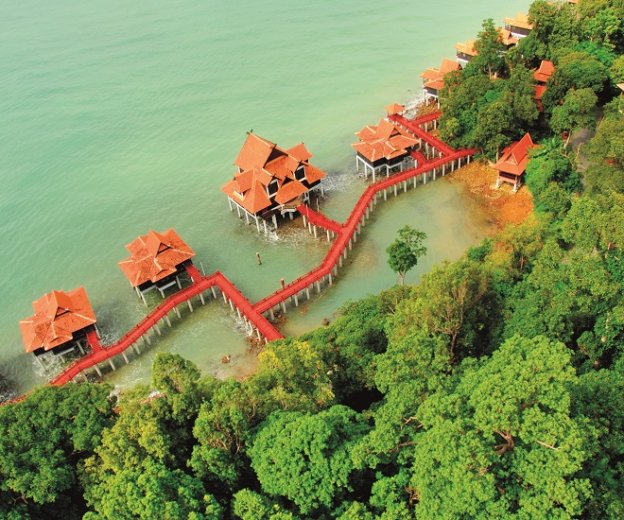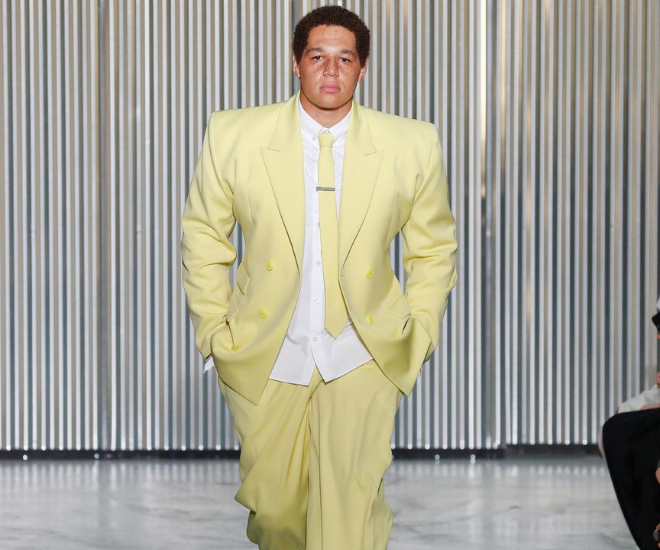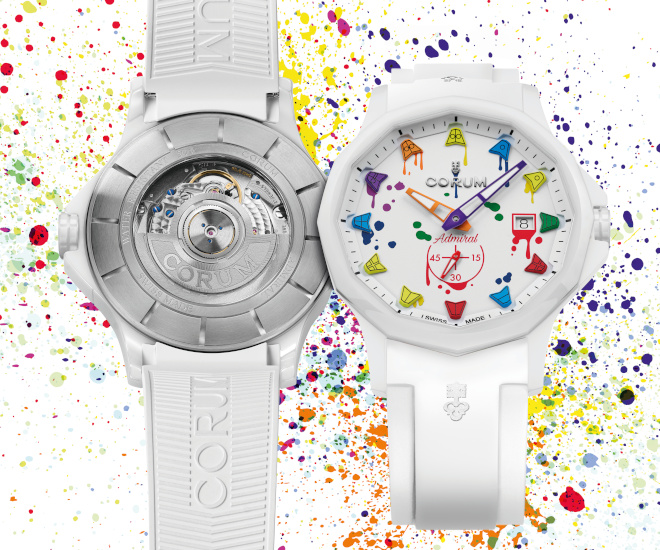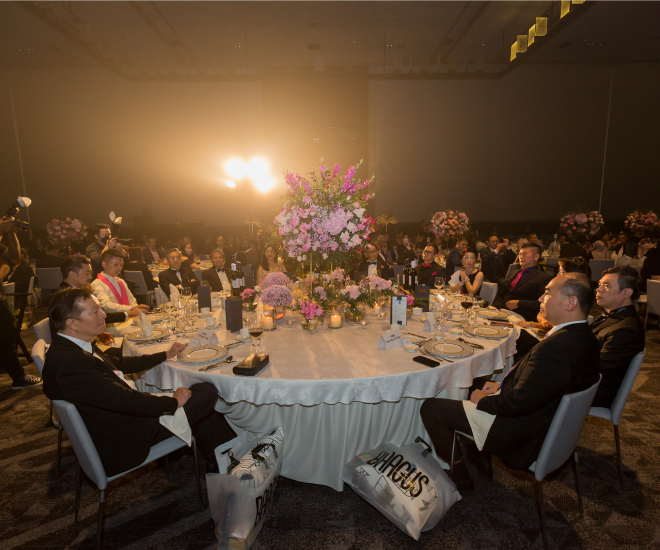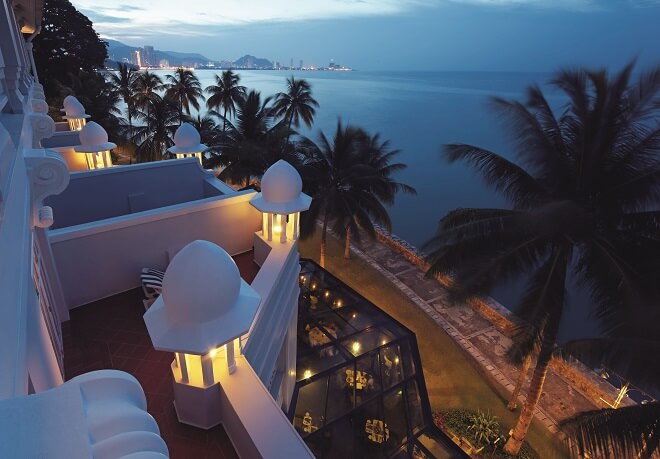
E&O Hotel and Straits Quay look toward Kedah Peak
Penang
The venerable Eastern and Oriental (E&O) Hotel on Penang island is the perfect place to begin such a sojourn. Guests gaze out at imposing Kedah Peak, or Gunung Jerai in Malay. Few realise Sungai Mas at its base, a source of fresh water, was a former stop-over along the Silk Road of the Sea. The E&O, established in 1885 by the Armenian Sarkies brothers, who went on to build Raffles Hotel in Singapore and The Strand in Rangoon (Yangon), was itself part of the colourful panoply of life in the East during the British Empire.
Back then, it had another purpose. Kedah Peak, Aceh at the northern tip of Sumatra, and Galle in southern Sri Lanka, formerly Ceylon, are all at roughly the same 6°N latitude. Ancient Malay and South Asian sailors could navigate due east-west along fixed latitudes, using sun and star observations, plus distinct landfalls like these, and dead reckoning, for circa two thousand years before accurate ways to measure latitude and longitude were found. Battery-powered GPS satellite fixes are a very recent innovation.
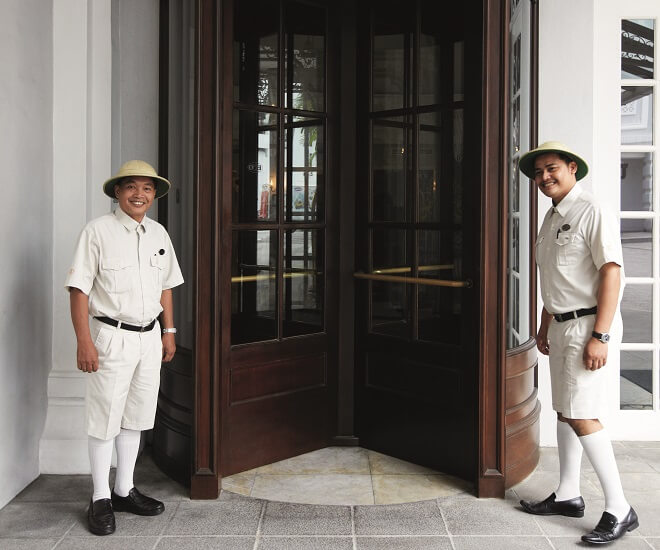
Penang’s British period began with Captain Francis Light, a British East India Company officer and aficionado of Malay and Siamese languages and cultures. He formally launched a British settlement there in 1786, having negotiated a defence and compensation treaty with Sultan Abdullah of Kedah which, to his chagrin, was not honoured.
The BEIC upgraded Penang to the same status as Bengal and Madras in 1805 and, says former Far Eastern Economic Review writer and historian Ilsa Sharp in her fascinating book The E&O Hotel – Pearl of Penang, (Marshall Cavendish Editions) “duly despatched a boat-load of British Raj administrators to run it.
When the Suez Canal opened in 1869, Penang became more accessible to Peninsula and Orient (P&O) steamers, which had already been calling via the Cape of Good Hope for 25 years. Assorted writers, artists, adventurers, wealthy travellers and government people began flooding through. Until World War 1 ended in November 1918, less than a century ago, nobody needed passports as we know them today.
That intrepid traveller Isabella Lucy Bird was one late 19th century chronicler. She wrote many books, including the memorably-titled The Golden Chersonese and the Way Thither, about Penang and the Malay peninsula, reportedly first described by Ptolemy in 150 AD.
By the 1920s, the E&O was billed as “The Premier Hotel East of Suez” with “The Longest Seafront of any Hotel in the World”. Guests have included Mary Pickford and Douglas Fairbanks, Noel Coward, Rudyard Kipling, Somerset Maugham, Hermann Hesse, and more recently Malaysia’s founding father Tunku Abdul Rahman, Singapore PM Lee Kwan Yew, several Kings of Malaysia serving their six year terms, the Sultan of Brunei, and actors such as Joan Chen.
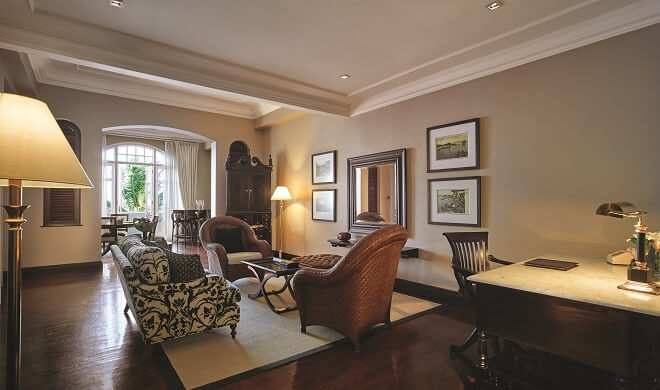
The Writer’s Suite at the E&O.
As Ilsa Sharp remarks: “There was only one hotel in any one location that anybody of means and breeding would even consider for their lodging.
“An early version of the five-star rating would be the Taj in Bombay, Galle Face in Colombo, the Grand in Calcutta, the Strand in Rangoon, the Oriental in Bangkok, Raffles in Singapore, the Hotel des Indes in Batavia (Jakarta), the Manila Hotel, the Peninsula in Hong Kong, the Cathay (now Peace) Hotel on the Bund in Shanghai…and in between, the E&O in Penang”.
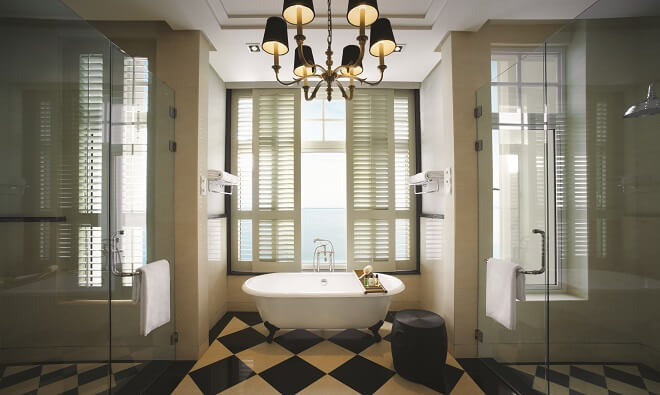
A bathroom in the recently-opened Victory Annexe.
Today the E&O has 100 suites in its Heritage Wing, extensively renovated and upgraded in the late 90s, and 132 suites in the restored Victory Annexe, which opened in 2013 and is outfitted in the same style. Definitely worth a stay, or at least a drink in Farquar’s Bar. Perhaps have dinner at Sarkies, or in the 1885 Restaurant, which retains its grand piano.
The publicly-listed E&O Group under Dato Seri Terry Tham also owns the historic Lone Pine Hotel at Batu Ferringhi Beach, and the newly-developed Straits Quay complex on Gurney Drive, which has a 40-berth marina for vessels to 25m, although silting caused by reclamation can affect the approaches.
Langkawi
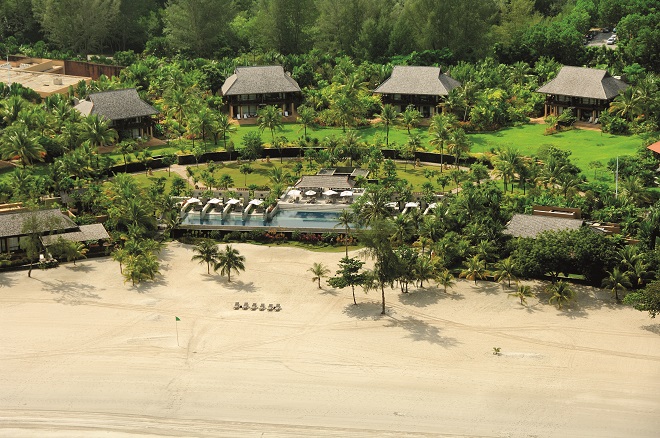
Four Seasons Resort on the lovely fine white sands of Tanjung Rhu Beach in Langkawi
Langkawi’s spectacularly attractive 104-isle group, 60 nm north, was awarded Penang’s former Duty Free status, a big revenue earner, as the impressive 4th prime ministership (1981-2003) of Dato Dr Mahathir Mohamad began.
Born in Kedah, he was a teenager when the Imperial Japanese Navy used the fjord-like coves of this pretty archipelago, in his home state, as a hideout in World War 11, and he later became a medical doctor there.
Once he was in power, Langkawi acquired a commercial airport, and five-star hotels gradually appeared. By 1989 Dr Mahathir was able to hold a British Commonwealth Heads of Government Meeting in Langkawi. CHOGM soup had a subsequent years-long lifespan on the bistro menu at Pelangi Beach Resort, where the get-together took place, much to the puzzlement of later guests.
In 1990 the island-hopping Port Klang-Pangkor-Penang-Langkawi Raja Muda Regatta was launched. A unique event, unlike anything else except for perhaps Antigua Week in the Caribbean, the Regatta offered overnight races between the isles, plus some inshores on arrival, and lots of parties. The 28th annual edition takes place in late November.
Dr Mahathir’s premier event, though, was the Langkawi International Maritime and Aerospace (LIMA) show, which attracted many important players in the defence industry. In 1997 we held Asia’s first Superyacht Rendezvous in conjunction with LIMA, and 16 vessels turned up, including the Sultan of Brunei in his 55m Bolkiah and his brother Prince Jefri in the also 55m Feadship Tits.
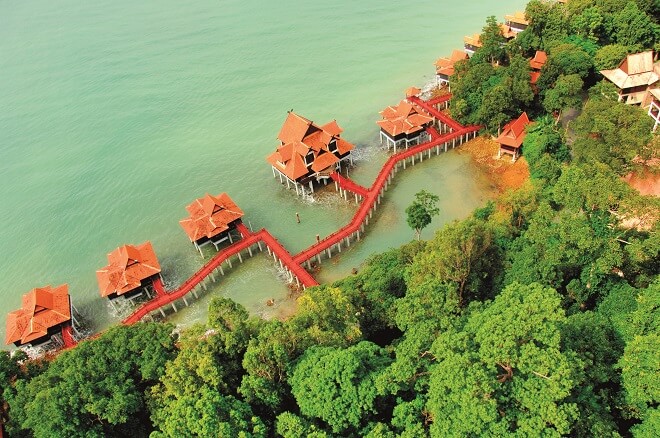
Renowned Berjaya Resort, also in Langkawi, with over-water villas on stilts. Sea otters are frequently spotted on this coast
Royal Langkawi Yacht Club in Kuah, the island capital, had by then developed a protected marina capable of berthing superyachts. Last year it opened further extensive residential and restaurant facilities. Nearby are Kuah’s long-serving Westin, and the recently-launched St Regis.
Telaga Marina on Langkawi Island’s West Coast has lately been graced by The Danna. Berjaya and the newly-opening Ritz-Carlton are in the vicinity, while Pulau Rebak Marina off famous Pantai Cenang has acquired the Vivanta by Taj.
Meritus-run Pelangi Beach Resort is where the marine tourism surge began, and the Raja Muda Regatta fleet anchored off it, sheltered by Pulau Rebak, for years before Royal Langkawi Yacht Club was built. Only the Andaman Resort is presently open at the Datai-Andaman complex and golf club on the far northwest coast, where the azure Andaman Sea begins, and in the isolated northeast, beautiful Tanjung Rhu Beach is home to the Four Seasons.
Many activities ashore and afloat are possible in these lovely “isles of legends”, where sea otters are often spotted, and sea eagles wheel overhead. A visit to coral reefs at Pulau Payar Marine Park 30 km away is worthwhile, and sailing and fishing are as popular as wining and dining. Previously open-slather Duty Free rules have been tightened, however, which may impact on a steady stream of private boaters arriving to pick up supplies.
Pangkor
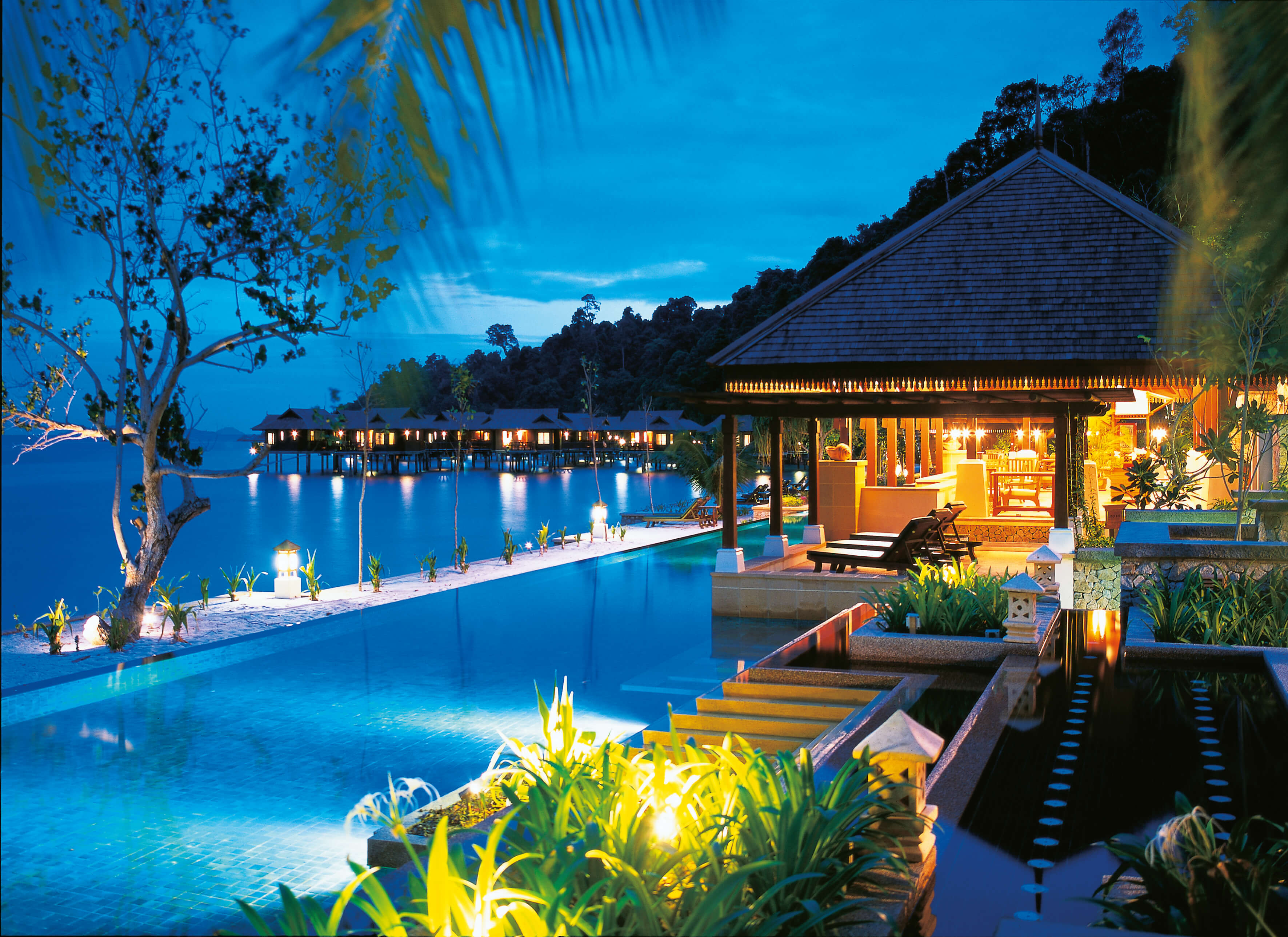
Pangkor Laut Resort features seashore and jungle settings. Monkeys roam the estate,
which offers a quieter yet still ultra-exclusive Malaysian island experience
Pangkor, the southern-most Malaysian West Coast tourist isle, is lesser-known than Penang and Langkawi, yet offers some secluded spots favoured by both regional and international celebrities.
Principal among them is a five-star enclave on Pangkor Laut, literally Little Pangkor Island, which is owned and operated by publicly-listed conglomerate YTL Corporation, founded by Tan Sri Dato Seri Dr Yeoh Tiong Lay, and now run by his eldest son Tan Sri Francis Teoh.
We first visited in 1986 aboard Scot John Guthrie’s classic 106’ schooner Dwyn Wen, after a race took place between Pansea-branded resorts in Phuket and Pangkor. The erudite Sultan of Perak, who later served as King of Malaysia, gave a tea party on the lawns, and visited our vessel. It was all very couth for a yachtie event, and it proved the inspiration for the King’s Cup Regatta, which was launched in Phuket the following year.
Today this much-upgraded facility is known simply as Pangkor Laut Resort, one of many in the YTL international property portfolio. It retains its somewhat unique Malaysian character in a beach and jungle setting where wild monkeys frequently come out to play. YTL’s 36 m Tecnomarine superyacht YTL Princess is occasionally about.
There are other more modest dwellings on Pangkor and the adjacent mainland, which is connected to Pangkor by ferry from the town of Lumut at the mouth of the Dindings River. A Royal Malaysian Navy base is nearby. These islands and the coast are quieter than their northern neighbours, yet to some, this is their greatest attribute.
From: Yacht Style #39. This article has been edited for length.
